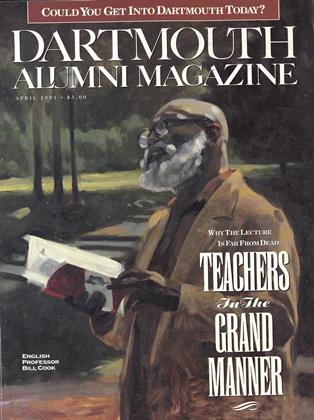Was leading the Continental Army an act of treason? Two alumni say Washington was just doing his job.
By leading the Continental Army in revolt against the Crown, George Washington was nothing less than a turncoat and a traitor. So charged English Lord Robert Goff last June at a meeting at the Supreme Court of the American Inns of Court Foundation. The British barrister wasn't trying to pick a fight. Representing the Pegasus Foundation, an organization which sponsors exchange and camraderie between British and American lawyers, he suggested a series of friendly legal challenges. At stake in these challenges would be the Pegasus Cup, a trophy to be awarded to the team demonstrating the most outstanding advocacy—regardless of the verdict. Goff suggested that the first challenge would be the trial of George Washington for treason, set in the year 1779.
Three members of the Inns of Court, including Michael Coffield '62, accepted the challenge, and soon a defense team was assembled which included JLanny kurzweil '75. All was set: General Washington would be tried under the laws of eighteenth-century England on October 18 before a tribunal of judges (two British, one American) in London. If found guilty, he would hang.
"I took it as seriously as a heart attack," says coffield. "I looked at this case as if our nation's right to exist were really in question." So did Kurzweil—he estimates that he invested over 200 hours in preliminary preparation, studying history and old laws and meeting with the "client," "witnesses," and the other lawyers.
kurzweil did the direct examination of witness Ben Franklin in court, while Coffield questioned Washington and led the defense. Kurzweil says that seeing the trial escalate into a media event, with coverage by the BBC, caused him more than a little anxiety. For the first time in his law career he experienced stage fright. "As soon as I started speaking in court, though," he says, "I felt right in my element. I was just a lawyer doing my job." Though he had prepped his witness, he did not use a script. "I'm a better lawyer than an actor," he explains.
Some important issues were at stake—issues that take on a special poignancy today: When is it right to substitute one government for another? How do you sue for peace without making war? In answer to these questions Coffield pointed to the "self-evident" rights of self determination, self defense, and social contract—rights which the British violated by imposing punitive taxes, denying colonists the rights of Englishmen, and quartering soldiers in their houses.
Washington was acquitted, much to the relief of everyone, including the British. We can all rest assured that Coffield, kurzweil, at al. have once and for all established the legitimacy of the American Revolution. If you wish you'd been there to see it, check your television listings-PBS is negotiating for the rights to the BBC coverage which aired in Britain on February 16.
Defense lawyers Michael Coffield '62 andLanny Kurzweil '75 (back row, middleand right) worked to keep Washington'sneck from the noose.
 View Full Issue
View Full Issue
More From This Issue
-
 Cover Story
Cover StoryTeachers in the Grand Manner
April 1991 By DEBORAH SCHUPACK '84 -
 Feature
FeatureA Recent Interview with Ernest Martin Hopkins' 01
April 1991 -
 Feature
FeatureHer Friend the Dalai Lama
April 1991 By Peter Bien -
 Feature
FeatureSTEVE KELLEY IN TWO ACTS
April 1991 By ROBERT ESHMAN '82 -
 Feature
FeatureCOULD I GET IN TODAY?
April 1991 -
 Feature
FeatureDisengagement
April 1991 By John Sloan Dickey '29
Heather Killebrew '89
-
 Article
ArticleBack to Ma
SEPTEMBER 1991 By Heather Killebrew '89 -
 Article
ArticleWay Under the Volcano
NOVEMBER 1993 By Heather Killebrew '89 -
 Article
ArticleTalk About Suspense
FEBRUARY 1994 By Heather Killebrew '89 -
 Article
ArticleThe Coolest Job in America
June 1994 By Heather Killebrew '89 -
 Article
ArticleFamiliar Ring
December 1994 By Heather Killebrew '89 -
 Article
ArticleA Funny Thing Happened on the Way to the O.R.
April 1995 By Heather Killebrew '89







